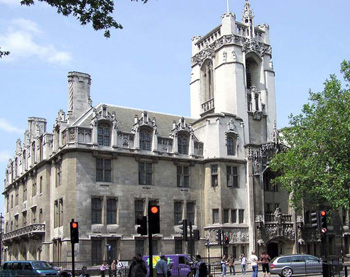Law Weblog
Are black people more likely than whites to be stopped and searched?
Sunday 17 October 2010 at 8:07 am | In News | Post Comment An article in today’s Observer, claims that black people are 26 times more likely than white people to be stopped and searched by police in England and Wales. This is based on evidence in a report by The Open Society Justice Initiative which makes international comparison and reveals”staggeringly high” levels of what is said to be racial profiling among British police using Section 60 of the Criminal Justice and Public Order Act 1994.US civil rights activist Jesse Jackson, who arrives in London today to launch a campaign aimed at curbing what he says is stop-and-search discrimination, described the figures as “astonishing”.
The figures have to be treated with caution, for example they only relate to stop-and-search under Section 60, which allows police to search anyone in a designated area without specific grounds for suspicion, and the Observer article combines figures from different reports.
Under section 1 of the Police and Criminal Evidence Act, which requires officers to have reasonable suspicion for a stop search, black people are seven times more likely to be stopped than white people.
Although Home Office guidance states care must be taken not to discriminate against ethnic minority groups, it says there are times when officers should “take account of an individual’s ethnic origin in selecting persons and vehicles to be stopped”.
A Civitas report published today, concludes that disparity in stop and search numbers is not necessarily unfair.
Today’s Observer takes a different view, but confines its ‘evidence’ to Sec 60 stops.
Other reports show that Asians were 6.3 times more likely to be stopped than whites, according to the analysis of Ministry of Justice figures for 2008-09, and that new draft Home Office guidance will allow police to stop and search on the basis of ethnic origin under Section 60.
Defences to murder
Saturday 9 October 2010 at 6:27 pm | In News | Post CommentThe circular is now available here
New Legal Services Ombudsman – effective from 6 October 2010
Thursday 7 October 2010 at 7:32 am | In News | Post Comment From 6 October 2010 complaints about lawyers in England and Wales will be dealt with by the new Legal Services Ombudsman.The Legal Services Ombudsman is a totally independent service for handling legal complaints.
No service complaints will be passed from existing complaints handling bodies to the new Legal Ombudsman.
The term ‘lawyer’ it means any of the legal professionals listed below.
Each branch of the legal profession has its own professional body responsible for setting its standards of conduct and service. These professional bodies are also responsible for investigating complaints.
- Solicitor – contact The Legal Complaints Service (LCS) formerly known as the Consumer Complaints Services;
- Barrister – contact The Bar Standards Board (BSB);
- Licensed Conveyancer – contact The Council for Licensed Conveyancers (CLC);
- Legal Executive – contact The Institute of Legal Executives (ILEX);
- Patent Attorney – contact The Chartered Institute of Patent Attorneys (CIPA);
- Trade Mark Attorney – contact The Institute of Trade Mark Attorneys (ITMA).
- Law Costs Draftsman – contact The Association of Law Costs Draftsmen
Zahida Manzoor CBE is the Legal Services Ombudsman (LSO) for England and Wales
(Note: ‘ombudsman’ is a non gender specific word of Swedish origin)
Changes to defences to murder – provocation and diminished responsibility
Monday 4 October 2010 at 9:50 pm | In News | Post CommentDefences to the law of murder were changed today, 53 years after the last change by amendments to the Coroners and Justice Act 2009.
Provocation has been replaced by a new defence of “loss of control” caused by “a fear of serious violence”. This may be a response to “words or conduct which caused the defendant to have a justifiable sense of being seriously wronged”.
In practice it would mean that a man who kills his wife after discovering her infidelity will now not be able to succeed with the defence of provocation.
But it would be available for parents who catch a paedophile molesting their child or a rape victim taunted by her attacker because they would be “seriously wronged”.
A mother who kills a man trying to rape her child would be in “fear of serious violence” and might be able to use the defence.
Diminished responsibility has been replaced by a new defence based on “recognised medical conditions”.
The act clarifies the Infanticide Act 1938, now the offence and defence of infanticide only applies to women and then if she would otherwise be found guilty of murder or manslaughter.
There has been no circular by the Home Office with the commencement of the act and it will be a little while before it is clear how the changes will apply in practice.
It is thought that the existing case law on provocation will be of less significance, but can still be used.
It is generally accepted that existing diminished responsibility cases may continue to be prayed-in-aid.
Both defences continue to be specific and partial.
Employment Law changed on 1st October 2010
Monday 4 October 2010 at 5:30 am | In News | Post Comment Friday 1st October 2010 saw the coming into force of a condolidating Act, the Equality Act 2010, and cosolidating regulations dealing with disability. The annual increase in the national minimum wage was also included.The Equality Act 2010 simplifies and harmonises the different strands of discrimination law that have developed over the last 40 years, and also introduces some key new initiatives to tackle actual and perceived inequality in the workplace. The Act:
- Sets out the basic framework of protection against direct and indirect discrimination, harassment and victimisation
- Introduces a new concept of discrimination arising from disability to restore the protection from disability-related discrimination (lost as a result of the decision in London Borough of Lewisham -v- Malcolm [2008])
- Prevents employers from asking pre-employment health questions except in specified circumstances
- Makes pay secrecy clauses unenforceable in specified circumstances
- Gives employment tribunals new powers to make recommendations relating to the whole workforce
- Allows voluntary positive action
Increases to National Minimum Wage
- Standard rate (for workers aged 21 and over): £5.93, up from £5.80
- Development rate (for workers aged between 18 and 20): £4.92, up from £4.83
- Young workers rate (for workers aged under 18 but above compulsory school age, who are not apprentices): £3.64, up from £3.57
- Apprentice rate (new: for apprentices under 19 years of age or apprentices aged 19 or over but in the first year of their apprenticeship): £2.50
Nine Supreme Court justices to hear appeal
Friday 17 September 2010 at 4:59 am | In News | Post CommentOn 18 of October, the Supreme Court will hear a case of high constitutional importance: does a criminal court in Britain have jurisdiction to try an MP accused of making a dishonest claim for expenses or are such matters exclusively within the jurisdiction of parliament and not matters for the ordinary courts.
The Court of Appeal certified that the case raised a point of law of general public importance.
Nine justices will sit – the normal number is five – because of the matter is not only of public importance, it is of constitutional importance.
The lawyers for the three are expected to cite article 9 of the bill of rights 1688, which says “That the Freedom of Speech and Debates or Proceedings in Parliament ought not to be impeached or questioned in any Court or Place out of Parliament.”
The supreme court arguments may well be televised, live.
Law of murder “ripe for reform” says Starmer
Friday 10 September 2010 at 8:43 am | In News | Post Comment In 2006 the Law Commission proposed the American type offences of first and second-degree murder. They said that the law of murder was “a rickety structure set upon shaky foundations … some of its rules have been unaltered since the 17th century … even though it has long been acknowledged that they are in dire need of reform.”This week Keir Starmer, the director of public prosecutions added his voice to those who have called on parliament to vary the degrees of murder.
Starmer argues that some categories of murder should be downgraded and some manslaughter upgraded.
It is argued that where a person ‘only’ intends to inflict grievous bodily harm it should be not be dealt with in the same way as intentional murder.
Currently, where a death results from the intention to cause grievous bodily harm the law can allow groups of people to be convicted of murder; the law of joint enterprise. This principle has recently been used to round up gangs of young people and sentence them to life for crimes they did not literally commit.
Starmer believes it is time to bring in reform.
Prison works – Civitas
Tuesday 31 August 2010 at 6:00 am | In News | Post Comment Ex-Home Office criminologist Professor Ken Pease has contributed to the ‘prison works’ debate. On the one hand Michael Howard says ‘prison works’ but on the other hand the current Lord Chancellor, Ken Clarke says fewer criminals should be locked up. Professor Pease’s report, Prison, Community Sentencing and Crime, has been released by the think-tank Civitas.Professor Pease said community sentences have no evident effect on reconviction rates in their current form.
Using community sentences to replace short prison sentences simply “freed the group most likely to reoffend to do so sooner, with no evidence of a current treatment benefit from community sanctions to offset that.”
Pease said arguments for fewer short sentences failed to take into account that jailing persistent offenders gave the public a respite from crime.
Whether prison helps cut crime has been distorted by “convenient fictions” that it is expensive and less effective than community sentences.
Far from paying a higher price for custody, a greater price is paid for the failure of community sentences to reduce criminality.
And once a prison sentence has been served the deterrent effect has gone.
The report goes on to say that well-resourced and well delivered community sentences can work whereas some people in prison find it much easier than on a community sentence where they have to get up in the morning and do something useful.
Investigatory Powers Tribunal hears its first case (after 10 years)
Tuesday 10 August 2010 at 10:13 am | In News | 1 Comment On 30 July 2010, for the first time in its 10 year history the Investigatory Powers Tribunal (IPT) heard a challenge at an open hearing.It ruled that it was not a proper purpose and not necessary to use surveillance powers to spy on a Dorset couple who were thought to be living outside the catchment area for the over-subscribed Lilliput First School, which they wanted their child to attend.
The IPT further found that the surveillance breached the family’s right to privacy under Article 8 of the Human Rights Act.
Section 65 of the Regulation of Investigatory Powers Act 2000 set up the Investigatory Powers Tribunal, which exists to investigate complaints about conduct by various public bodies.
Jenny Paton and partner Tim Joyce took Poole Borough Council (PBC) to the tribunal because the council had used the Regulation of Investigatory Powers Act (RIPA) to spy on her family 21 times.
Almost 800 public bodies – including 474 local councils – under RIPA assumed powers to snoop through covert surveillance, phone records and private correspondence. It is argued that councils need the powers to target “serious criminals such as fly tippers, rogue traders and benefit fraudsters”.
Some on-the-spot fines to end
Tuesday 10 August 2010 at 9:34 am | In News | Post Comment On-the-spot fines for being drunk and disorderly, shoplifting, disorder and threatening and abusive behaviour are to be discontinued because they are not working.In a pilot scheme in parts of London police officers will use court action or “words of advice” instead of fines.
Some 45,616 fixed penalty notices were issued in England and Wales but 24,713 were not paid. This is seen as wasting police time and not acting as a punishment or deterrent.
Powered by WordPress with Pool theme design by Borja Fernandez.
Entries and comments feeds.
Valid XHTML and CSS. ^Top^






